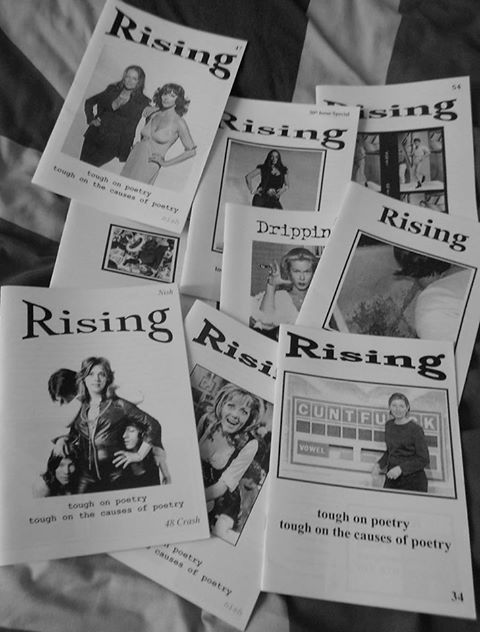Astronaut #1
-Reviewed by Alana Tomlin–
Astronaut brings a brief assortment of poetry and short prose from, the title implies, ‘outer space’. What this actually means is that it is writing brought together in a clean, refreshing way – young writers, and new ideas. As always, being a first issue, it faces the challenge of being noticed and, even harder, to be bought and read. In response to this the magazine’s overt association with ‘outer space’ perhaps indicates that the editor, Charlotte Henson, realises that a new magazine’s primary duty is to explore ‘alien’ literary territory, and to be proud to publish what is discovered there. The alien here is by no means experimental or avant-garde; it is a space sometimes hinting at the surreal, just beyond the boundaries of what can still be interpreted as mainstream or traditional writing, and ‘alien’ writers who have not yet been published in dozens of literary magazines. Although it stands for eclecticism, a mild current of similarity runs between the works. However, this current is a vivid one, alternating between work which packs a well-needed literary punch and more unsatisfying content.
Featured poet Helen Mort’s piece ‘Outtakes’, about capturing simple details in film, is by far the strongest in the magazine. It is also a useful lens through which to appraise the magazine’s other output. The poem opens with delicate, emotive force, ‘You taught me longing is a matter / of suggestion’. This line summarizes Mort’s poem, which lingers on various mundane shots, such as a favourite ‘view of other people’s windows,/glowing on a terraced street at night’, elevating these moments while keeping them movingly honest.
Looking at some of the titles in the rest of the poetry-heavy issue (‘Dare’, ‘Benevolence’, ‘Jealous of your fighting skills’…), you’d be forgiven for thinking other offerings would be jarringly angst-ridden. Instead, the works undercut this stereotype by portraying openly the complications of human relationships with the world, others and themselves in a linguistically intriguing way. Take Betty Doyle’s poem ‘Scott’ for instance, in which she portrays an argument between a couple where they ‘plead under that porch light’ and refer to ‘laddered loveheart tights’. The soft consonance in these Doyle lines makes the couple’s breakdown touching, and memorable.
A few of the pieces echo ancient myth and traditional literary figures. This is in keeping with the final page of the magazine, ‘Starting Points’, which gives a thoughtful writing prompt to research local myth and folklore. I enjoyed the magazine’s forthright acknowledgement that many of its readers would also be (potential) writers. One such work is O. Goldstein’s prose piece ‘On The Eve Of St. Agnes’ in which he makes reference to Keats in a whimsical, romantic vein, immediately after sex: ‘He remembers Keats. They glide like phantoms into the wide hall. Like phantoms they glide.’ This is a sharp contrast to the rest of the piece’s dramatic, repetitive syntax and is all the more striking for it.
Another work utilizing myth, and a favourite poem in this issue, is ‘Archipelago’ by John Clegg. ‘Archipelago’ is the most narrative poem in the magazine and it deals with classical reference beautifully, by being aware of both the dangers and power of such recycled references:
‘The odd tide deposits
more of the same.
Our gods speak in stone,
these were the birth screams.’
The first two lines of this stanza focus on the inconsequential quality of nature, which ideologically and linguistically juxtaposes the fierce, godly and immortal message in the final two lines. The explicit, poetic sincerity of the last two lines about classical gods is dampened therefore by the first half. This is one of the many examples in the magazine of writers not taking themselves wholly seriously, with enjoyable results.
Astronaut is an economical magazine with a slight edge. Its layout is pleasing, as are its two pieces of jagged artwork by Sophie Gainsley and minimalist cover. The Astronaut blog revitalises its simple black and white print feel: it showcases some carefully chosen creative work, in between images of gnarling mole-like creatures and witty posts from the editor Charlotte Henson.
In the interview with Mort, Henson asks: ‘Do you think it is important young writers ought to have their own platform rather than one integrated with, older, perhaps more experienced writers?’. I think the magazine answers its own question by a second or third reading. There is promise in many of the pieces, despite some trying too hard to be subversive. What can’t be denied is a feeling of excitement about the future of the writers involved, there is no reason why Astronaut can’t grow in strength and exist as an eclectic platform especially for new, enthusiastic writers with an edge. The personal, outspoken and questioning feel of many of the pieces was actually a commendable change from perhaps more controlled and ‘mature’ poetry.




Reblogged this on astronaut.